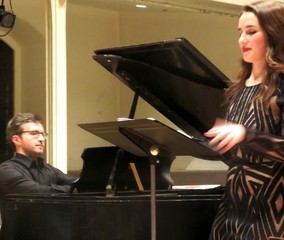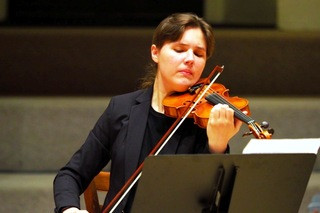|
Back
Tone-Rows By Any Other Name... New York
St. Mark’s Church in-the-Bowery
03/23/2017 -
“Air Schoenberg: Connecting Flights”:
Arvo Pärt: Fratres
Alexander von Zemlinsky: Irmelin Rose und andere Gesänge, Op. 7: No. 2 “Entbietung”
Anton Webern: 5 Lieder aus “Der siebente Ring”, Op. 3
Alban Berg: Sieben frühe Lieder: No. 3 “Die Nachtigall” – Schliesse mir die Augen beide
Arnold Schoenberg: String Quartet No. 2, Op. 10 – Sechs kleine Stücke, Op. 19 – Vier Lieder, Op. 2: No. 3 “Erhebung”
Erich Wolfgang Korngold: 5 Lieder, Op. 38: No. 1 “Glückwunsch”
Alfred Schnittke: Silent Night
Franz Schubert: Erlkönig, D. 328
Ariadne Greif (Soprano)
Conor Hanick (Piano), Anna Tsukervanik, Natalie Kress (Violins), Chelsea Wimmer (Viola), Dan Barrett (Leader/founder, Cello)

C. Hanick, A. Greif (© Samuel T. Dog)
“I feel air from another planet.”
Stefan George, Rapture
Last night’s concert at St. Mark’s in-the-Bowery Church embraced romance, passion, love, emotion, demonism, pathos, jokes, a Christmas carol and...
And Arnold Schoenberg???
Yes, the supposedly dour dodecaphonist was the cynosure of this enlightening and iconoclastic concert by the cryptically christened International Street Cannibals (ISC). True, this ensemble of splendid soloists, under the direction of cellist Dan Barrett, has the virtuosity to gobble up the most difficult notes and musically spew them out. Yet until one attends a concert by this group, one doesn’t realize how they transform both the music and the language.
Now I must confess that on this unnaturally frosty evening, I wasn’t terribly thrilled on hearing a program consisting of mainly Schoenberg, along with his mentors and acolytes (though he would reject that last word). But the venerable old church was only two blocks from my apartment, the reputation of ISC was audacious, and my curiosity about their selections made attendance mandatory.
More important, Arnold Schoenberg, whose String Quartet (actually a quintet with soprano) was the centerpiece of the program, was surrounded by composers whose own languages became a Tower of Babel. And this would have vastly satisfied Schoenberg himself.
The title “Air Schoenberg” was as misleading as the name International Street Cannibals. For the opening itself was hardly of the Viennese School. Arvo Pärt’s Fratres fits no school. But unlike other iconic endlessly repeated pieces, this is always intriguing. No matter what the combination, one is transported to 14th Century, 20th Century, to a universe of spaces and shooting stars and black holes.

A. Tsukervanik (© Michael Li)
Here, though, it was given an absolutely ferocious performance by the stunning Uzbek violinist Anna Tsukervanik. This was not the language of spaces, but of sheer emotional anger, the harmonics, the pizzicati the sinuous bowings given a language all their own.
And would Dr. Schoenberg have approved? Yes, he had his own credos, but, even he agreed that “there is plenty of room for music in C Major.”
Ms. Tsukervanik continued with another un-Schoenbergian work, Alfred Schnittke’s own Silent Night. Those familiar with Schnittke were enamored of the most undogmatic rendition. Yet had the windows been open in the East Village and the daunting quarter-tones and dissonances been heard, neighbors would have easily clucked “Oh, it must be a six-year-old child. Her poor mother certainly is going crazy.”
If this concert had one other star is was soprano Ariadne Greif. The vocal works here were more suitable constellations around Mr. Schoenberg. But the selections were, with few exceptions echt-Romantic, music which was pulling at the yokes of the diatonic scale, sometimes breaking through, but always retaining its passion.
And she was the soprano to essay each one. Coming near to the hysteria of the poems, but always, always keeping hold of her stunning voice.
That was simple enough in Erich Korngold’s song–which he plagiarized for his own music to the Warner Brothers movie Devotion. (Believe it or not, this was a 1946 weepie with Olivia de Havilland and Ida Lupino as the Brontë sisters!) Ms. Greif was not afraid to pull out the Romantic steps from Mr. Korngold, a Schoenberg student whose own genius was in opera and film. Nor did she hold back in the first version of Alban Berg’s Close Both My Eyes. He had written this as a 19th Century passionate song–arranging it much later as a tone-row.
And as the ISC group proved throughout the evening, the Schoenberg process, in tandem with other styles, proved far less dissonant, far less revolutionary than its predecessors.
Even the songs of Webern became dramatically intense, as sung by Mr. Greif, with pianist Conor Hanick. One thought of dodecaphonic tone-rows as bagatelles, little jewels which were held up somehow on their delicate strings. Mr. Hanick also played Schoenberg’s six bagatelles for piano, a work hardly tonal but hardly alien, with a romantic touch.
Her own recital began with Schoenberg’s brother-in-law, Alexander von Zemlinsky, another near-Romantic–and ended with Schubert’s The Elf-King, a piece of sheer terror, showing Ms. Greif’s own dramatic sense.
The core was of course Schoenberg’s Second String Quartet, which would probably be called revolutionary. That, though, is an exaggeration. This was not written with a tone-row (that didn’t come until 1923). And while it seemed to skirt tonality, the composer would be the last to call it “atonal.”
“Describing music as ‘atonal’” he once said, “is like describing ‘flying’ as ‘not falling down’ or ‘swimming’ as ‘not drowning.’”
Yet the four ISC players here were even more aware of the consonance of this work. The opening could have been by Brahms, the last two movements with Ms. Greif singing the poems of Schoenberg’s favorite poet, Stefan George, was like listening to Mahler gone only slightly off the tracks.
In fact, in this most innovative concert, one was taken back to music of Brahms, to a tonality in the last movement which could have been from Schoenberg’s greatest inspiration Mozart.
More important, these players penetrated into the poetic essence of the work. The memories evoked by the first movement dashed into the comic scherzo. Yes, it was a joke of sorts (though Schoenberg was no Stephen Colbert). But if the hysteria veered between manic and jocular, he gave us (or rather, the second violin gave us), a Charles Ives moment, when, out of the hysteria came that nursery tune Ach du lieber Augustin.
The last two movements were highlighted again by Ms. Greif. Her voice here was not ethereal. It was searing, throaty and sometimes with striking emotion.
Whatever the title “Air Schoenberg” might have meant, she helped it soar on wings of song, while the others of International Street Cannibals brought the mesmerized audience the extremes of fire, ice and frequently even warmth.
Harry Rolnick
|